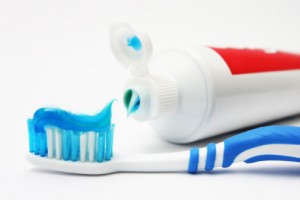Does Your Toothpaste Contain Triclosan?
Triclosan improves the effectiveness of fluoride toothpaste but may also pose risks

Arguments against Triclosan
Groups advocating for a total ban or reduction of triclosan in consumer products have mainly focused on antibacterial hand soaps. First of all, they fear overuse of antibacterial products may be contributing to the trend towards increased bacterial resistance and decreased effectiveness of antibiotics. Secondly, they worry that triclosan that enters waterways could be exposed to sunlight and turned into harmful dioxins. Finally, some studies have shown worrisome muscle function impairment in fish and mice exposed to triclosan. However, further testing would be required to prove similar results in humans.
Evidence for Triclosan
While there is no clinical evidence proving the health benefits of triclosan in hand soap, many clinical trials have proven that triclosan improves oral health. Recently, a team of researchers at the University of Manchester in England reviewed 30 previously published studies of toothpastes containing triclosan. After they combined all the data, they discovered that when compared with toothpastes containing just fluoride, toothpastes with fluoride and triclosan delivered a 22 percent reduction in plaque and gingivitis, a 48 percent reduction in gum bleeding, and a 5 percent reduction in tooth decay. The beneficial effects of triclosan in toothpaste have also been confirmed by the American Dental Association and by the FDA. Considering that gum disease and tooth decay are the leading causes of tooth loss, it seems wise to use every means available to prevent these oral health issues. However, it is up to each individual to weigh the proven benefits of triclosan against the as yet unproven risks.
What Does the FDA Say?
The FDA has called for further investigation of the issue. Right now, their focus is on making soap manufacturers prove that triclosan and other antibacterial agents are actually more effective at preventing illness than plain old soap and water. The FDA is apparently not convinced of the risks of tricosan, but wants to be sure that there are real benefits to balance any potential risks. In the case of toothpastes, the benefits have been proven and the FDA has not issued any statement against triclosan in toothpastes.




